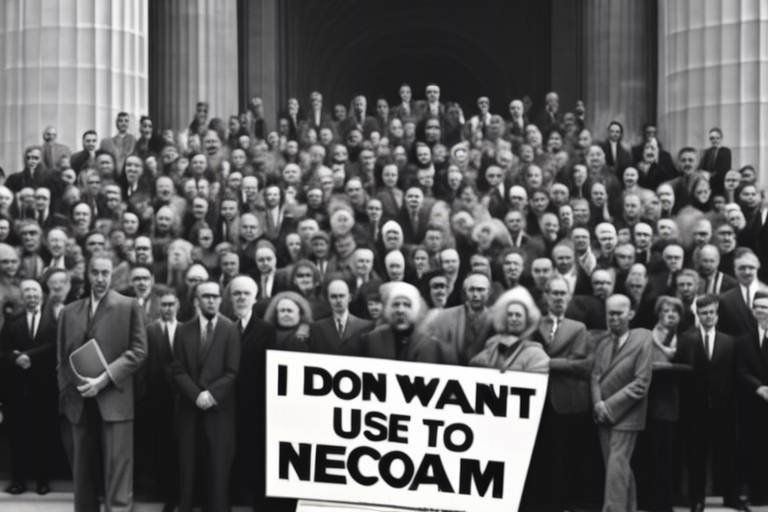Reflecting on the Philosophy of Radical Feminism
Radical feminism is a powerful and transformative ideology that seeks to challenge and dismantle the deeply entrenched structures of patriarchy that dictate our societal norms. It's not just a branch of feminism; it’s a profound critique of the very foundations upon which gender inequality is built. Imagine walking through a dense forest where every tree represents a societal norm, a tradition, or a law that perpetuates male dominance. Radical feminists are like skilled lumberjacks, armed with sharp axes, ready to chop down these trees and clear a path for a new world where equality reigns supreme.
The roots of radical feminism can be traced back to the social upheavals of the 1960s and 1970s, a time when women began to question their roles in society and demand more than just the right to vote or work. They sought a complete transformation of the societal landscape, envisioning a world where women could exist free from oppression and discrimination. This era was not just about gaining rights; it was about redefining what it meant to be a woman in a patriarchal society.
At its core, radical feminism emphasizes the need for systemic change. It argues that simply adding women to existing structures—like placing women in leadership roles within a male-dominated system—is not enough. Instead, radical feminists advocate for a complete overhaul of these systems to eradicate the roots of inequality. They challenge us to think critically about how power operates in our lives and how deeply embedded gender norms shape our experiences.
One of the most striking aspects of radical feminism is its critique of patriarchy. Radical feminists analyze how male dominance manifests in various aspects of life, from the workplace to the home. They highlight the insidious ways in which patriarchy operates, often under the radar, influencing our perceptions, behaviors, and interactions. This critique is not merely theoretical; it has real-world implications, affecting women's rights, safety, and opportunities.
To understand the impact of patriarchy, one must consider the intricate power dynamics at play. Patriarchy is not just about men exerting power over women; it’s about a complex web of relationships that perpetuate inequality. For instance, in many cultures, traditional gender roles dictate that women should prioritize family over career, limiting their economic independence and reinforcing their subordinate status. This is where radical feminism shines a light, urging us to reconsider these roles and the power structures that uphold them.
Furthermore, radical feminism embraces the concept of intersectionality, recognizing that women’s experiences are not monolithic. Women of different races, classes, and sexual orientations face unique challenges that intersect with their gender. By incorporating intersectional perspectives, radical feminists strive to create a more inclusive movement that addresses the complexities of oppression. This approach not only enriches feminist discourse but also ensures that the voices of marginalized women are heard and valued.
As we reflect on the philosophy of radical feminism, it becomes clear that its relevance extends beyond historical context. It continues to shape contemporary feminist movements, inspiring activists to challenge systemic oppression and advocate for women's rights on a global scale. Whether it’s through grassroots organizing, social media campaigns, or scholarly work, radical feminist ideas are alive and well, pushing us to confront the uncomfortable truths about gender inequality.
In conclusion, radical feminism is more than just a theory; it’s a call to action. It invites us to question the status quo, to think critically about power dynamics, and to envision a world where gender equality is not just an aspiration but a reality. By understanding its core principles and historical context, we can appreciate the profound impact radical feminism has had—and continues to have—on the fight for gender justice.
- What is radical feminism? Radical feminism is a branch of feminism that seeks to fundamentally change society by addressing the root causes of gender inequality, particularly the patriarchal structures that perpetuate oppression.
- How does radical feminism differ from other feminist ideologies? Unlike liberal feminism, which focuses on legal and political equality, radical feminism emphasizes the need for systemic change and critiques the very foundations of patriarchal society.
- What role does intersectionality play in radical feminism? Intersectionality is crucial in radical feminism as it recognizes that women's experiences are shaped by various factors, including race, class, and sexuality, and advocates for an inclusive approach to feminism.
- Who are some influential figures in radical feminism? Notable figures include Andrea Dworkin, Catharine MacKinnon, and bell hooks, who have all made significant contributions to feminist thought and activism.

Historical Roots of Radical Feminism
Understanding the origins of radical feminism is crucial for grasping its significance in the broader context of gender discourse. The movement emerged in the 1960s and 1970s, a period marked by social upheaval and a quest for civil rights across various demographics. Women's liberation was not just a call for equality but a demand for a fundamental transformation of society's structures. It was a time when women were starting to challenge the status quo, questioning the very fabric of a patriarchal society that had long dictated their roles and rights.
One of the pivotal moments in the rise of radical feminism was the second-wave feminist movement, which focused on issues such as reproductive rights, workplace equality, and sexual liberation. This wave was significantly influenced by earlier social movements, including the Civil Rights Movement and the anti-war protests. These movements laid the groundwork for a more radical approach to feminism, emphasizing the need for systemic change rather than mere legal reforms.
Key events such as the publication of Betty Friedan's "The Feminine Mystique" in 1963 and the formation of organizations like the National Organization for Women (NOW) in 1966 played a crucial role in galvanizing women. However, radical feminists felt that mainstream feminism was not addressing the deeper, more insidious roots of gender inequality. They argued that the problem was not just the lack of opportunities for women but the very systems of power that perpetuated their oppression.
Radical feminists sought to analyze and dismantle the patriarchy—a term that refers to the societal structures and norms that privilege men over women. This critique was not just about individual acts of sexism; it was about recognizing the systemic nature of gender oppression. The radical feminist perspective posited that to achieve true equality, society must undergo a radical restructuring.
As the movement gained momentum, several key figures emerged, each contributing unique perspectives and insights. For instance, Andrea Dworkin and Kate Millett became influential voices, advocating for a re-examination of sexuality and the portrayal of women in literature and media. Their works challenged traditional narratives and called for a reevaluation of how women are perceived and treated in society.
The historical roots of radical feminism are deeply intertwined with the broader struggles for social justice and equality. This movement's emergence was not an isolated phenomenon but part of a larger tapestry of activism aimed at challenging various forms of oppression. As we reflect on these historical developments, it becomes clear that radical feminism has played a pivotal role in shaping contemporary feminist thought and activism.

Key Principles of Radical Feminism
Radical feminism is not just a branch of feminist thought; it’s a profound critique of the very structures that underpin our society. At its core, radical feminism seeks to dismantle the systems of patriarchy that perpetuate gender inequality. It posits that the roots of women's oppression lie deep within the societal fabric, and thus, mere reforms are insufficient. Instead, radical feminists advocate for a complete transformation of societal norms and values. This ideology is built upon several key principles that challenge traditional views of gender and power.
One of the most significant aspects of radical feminism is its critique of patriarchy. This term refers not just to men holding power, but to a complex system where male dominance is normalized and reinforced through various societal mechanisms. Radical feminists argue that patriarchy is embedded in our culture, politics, and economy, creating a hierarchy that privileges men while oppressing women. This perspective encourages a re-examination of everyday practices and beliefs that we often take for granted. For instance, consider how language reflects power dynamics—terms like "manpower" or "mankind" subtly reinforce the notion that male perspectives are the default.
Moreover, radical feminists emphasize the need for systemic change. They argue that addressing individual instances of sexism or discrimination is not enough; we must also challenge the underlying systems that allow these injustices to persist. This means advocating for policies and practices that fundamentally alter the way society operates. For example, radical feminists might support initiatives that promote women's leadership in politics and business, ensuring that women's voices are not just heard but prioritized in decision-making processes.
When we talk about patriarchy, it’s essential to understand how it shapes power dynamics in both public and private spheres. Patriarchal structures create an environment where male authority is often unquestioned, leading to a culture that normalizes violence against women, economic disparity, and social subjugation. Radical feminists argue that this power imbalance is not just a personal issue but a societal one that requires collective action to address. They highlight that the fight against patriarchy is not merely about achieving gender equality but about dismantling the very systems that create and sustain inequality.
Another critical principle of radical feminism is its commitment to intersectionality. This concept acknowledges that women do not experience oppression in a vacuum; rather, their experiences are shaped by various intersecting factors such as race, class, sexuality, and ability. Radical feminists strive to incorporate these perspectives into their analysis, recognizing that the fight against patriarchy must also address the unique challenges faced by marginalized groups. By doing so, radical feminism becomes a more inclusive movement that seeks to uplift all women, not just those who fit a particular mold.
For instance, consider the experiences of women of color or LGBTQ+ individuals. Their struggles often intersect with issues of race, sexuality, and economic status, making their fight against patriarchy multifaceted. Radical feminists argue that to genuinely achieve gender equality, we must listen to and amplify the voices of these diverse groups, ensuring that the movement is truly representative of all women's experiences.
In summary, the key principles of radical feminism challenge us to rethink our understanding of gender, power, and oppression. By critiquing patriarchy, advocating for systemic change, and embracing intersectionality, radical feminists aim to create a society where all individuals can thrive, free from the constraints of oppressive structures. As we reflect on these principles, it's clear that radical feminism offers a vital framework for understanding and addressing the complexities of gender inequality in our world today.
- What is radical feminism? Radical feminism is a branch of feminist thought that seeks to dismantle patriarchy and address the root causes of women's oppression.
- How does radical feminism differ from other feminist ideologies? While other feminist ideologies may focus on legal reforms or social equality, radical feminism emphasizes the need for systemic change and critiques the foundational structures of society.
- What does intersectionality mean in the context of radical feminism? Intersectionality refers to the idea that various forms of oppression, such as those based on race, class, and sexuality, intersect and compound the experiences of individuals, particularly women.

Critique of Patriarchy
The critique of patriarchy is a cornerstone of radical feminism, serving as a lens through which the systemic inequalities faced by women can be examined. At its core, patriarchy refers to a societal structure where men hold primary power, dominating roles in political leadership, moral authority, social privilege, and control of property. This dominance is not merely a historical artifact; it is a living, breathing force that shapes our everyday realities. Radical feminists argue that this male-centric power structure is deeply embedded in various institutions, from the family unit to the legal system, and it perpetuates a culture of oppression that affects women globally.
Radical feminists assert that the roots of patriarchy are entrenched in both culture and ideology, often manifesting in the form of misogyny, sexism, and gender-based violence. By critiquing these structures, radical feminists aim to highlight how they not only limit women's rights but also dehumanize them. The impact of patriarchy can be seen in various aspects of life, including:
- Economic Disparities: Women often face wage gaps and lack access to leadership positions, perpetuating economic inequality.
- Violence Against Women: Patriarchy normalizes and excuses violence against women, making it a pervasive issue in society.
- Reproductive Rights: Control over women's bodies and reproductive choices is often dictated by patriarchal norms and laws.
To illustrate the pervasive nature of patriarchy, consider the concept of power dynamics. Patriarchy creates a hierarchy that privileges men while subjugating women. This dynamic is evident in various spheres of life, including the workplace, where men often occupy higher positions, and in relationships, where traditional gender roles can dictate power imbalances. Radical feminists argue that this imbalance is not just a personal issue but a societal one that requires systemic change.
The relationship between patriarchy and power dynamics is complex. It often operates through subtle mechanisms, such as socialization and cultural narratives that reinforce male superiority. For example, media portrayals of women often emphasize traditional roles, which can influence public perception and expectations. By challenging these narratives, radical feminists seek to dismantle the structures that uphold patriarchy and advocate for a more equitable society.
Moreover, radical feminism emphasizes the importance of intersectionality in understanding the critique of patriarchy. This approach acknowledges that women's experiences of oppression are not monolithic; they are shaped by various factors, including race, class, and sexuality. For instance, a Black woman may face different challenges compared to a white woman due to the intersection of racism and sexism. By incorporating these diverse perspectives, radical feminists aim to create a more inclusive movement that addresses the complexities of gender inequality.
In conclusion, the critique of patriarchy is not merely an academic exercise; it is a call to action. Radical feminists argue that to achieve true gender equality, we must confront and dismantle the patriarchal systems that perpetuate oppression. This involves rethinking our societal structures and advocating for policies that promote equity. The journey toward a more just society is ongoing, and understanding the critique of patriarchy is essential for anyone committed to social justice.
1. What is patriarchy?
Patriarchy is a social system where men hold primary power and dominate in roles of political leadership, moral authority, and control of property.
2. How does patriarchy affect women's lives?
Patriarchy leads to systemic inequalities, including economic disparities, violence against women, and restrictions on reproductive rights.
3. What is intersectionality in radical feminism?
Intersectionality is an approach that considers how various forms of oppression, such as racism and classism, intersect with gender inequality, creating unique experiences for different women.
4. Why is the critique of patriarchy important?
The critique of patriarchy is crucial for understanding and dismantling the systemic structures that perpetuate gender inequality and oppression.

Patriarchy and Power Dynamics
When we talk about patriarchy, we're diving deep into a system that has shaped societies for centuries. It's not just about men holding power; it's about an entire structure that prioritizes male experiences and perspectives while marginalizing those of women and non-binary individuals. This power dynamic is pervasive, influencing everything from politics to personal relationships. Imagine a game where the rules are designed to favor one team over another. In this case, that 'team' is men, and the rules are societal norms that uphold male dominance.
Radical feminists argue that this patriarchal structure creates a hierarchy that affects women’s lives in profound ways. Women are often socialized to accept subordinate roles, which can lead to a cycle of dependency and disempowerment. This dynamic isn't just a relic of the past; it's a living, breathing reality that informs how women navigate their daily lives. For instance, in many cultures, women are still expected to prioritize family over career, which can limit their opportunities for economic independence and personal growth.
To illustrate this further, let’s consider the workplace. Women often face challenges like the glass ceiling, which prevents them from reaching top positions despite qualifications. This phenomenon is a direct result of the power dynamics entrenched in patriarchal systems. Men are more likely to be promoted and recognized for their work, while women's contributions can be overlooked or undervalued. The statistics are telling:
| Statistic | Men | Women |
|---|---|---|
| Percentage in Leadership Roles | 75% | 25% |
| Average Salary | $70,000 | $50,000 |
These figures highlight a stark reality: even as women make strides in education and workforce participation, the power dynamics of patriarchy continue to hold them back. Furthermore, radical feminists emphasize that the effects of patriarchy are not uniform. Women of different races, classes, and sexual orientations experience these dynamics in varied ways, making it essential to adopt an intersectional approach when analyzing power structures.
In essence, the relationship between patriarchy and power dynamics is complex and multifaceted. It’s not just about who holds power but also about how that power is exercised and maintained. Radical feminists advocate for a complete rethinking of these structures, aiming to dismantle the systems that perpetuate inequality. They argue that true equality requires more than just equal representation; it necessitates a fundamental shift in how society views gender roles, power, and authority.
As we explore these dynamics, it's crucial to recognize that the fight against patriarchy is not just a women's issue; it's a human issue. Everyone stands to benefit from a society that values equality and justice for all. So, the next time you encounter a situation that feels inherently unfair, ask yourself: how does patriarchy play a role in this dynamic? Understanding this can be the first step toward creating meaningful change.
- What is patriarchy? Patriarchy refers to a social system in which men hold primary power and dominate in roles of political leadership, moral authority, social privilege, and control of property.
- How does patriarchy affect women? It affects women by limiting their opportunities, reinforcing gender stereotypes, and perpetuating inequalities in various spheres such as the workplace and home.
- What is intersectionality in radical feminism? Intersectionality is an analytical framework that considers how various social identities intersect and contribute to unique experiences of oppression and privilege.
- Can men be feminists? Yes, men can be feminists and play a crucial role in advocating for gender equality and challenging patriarchal norms.

Intersectionality in Radical Feminism
Intersectionality is a crucial concept within radical feminism, emphasizing that the experiences of women cannot be understood solely through the lens of gender. Instead, radical feminists recognize that various social categories—such as race, class, sexuality, and ability—intersect to shape individual experiences and struggles. This perspective is vital because it acknowledges that not all women experience oppression in the same way; the impacts of patriarchy are felt differently depending on a woman’s unique social position.
To illustrate this point, consider how a white, middle-class woman may face gender discrimination in her workplace, while a black woman from a lower socioeconomic background may encounter compounded layers of oppression due to both her race and class. Radical feminists argue that these intersecting identities create distinct challenges that must be addressed to achieve true gender equality. By incorporating intersectionality into their analysis, radical feminists push for a more inclusive approach that recognizes the diverse realities of all women.
Moreover, intersectionality encourages radical feminists to examine how societal structures—like capitalism and racism—interact with patriarchy to perpetuate systemic inequalities. For instance, the economic exploitation of women is often exacerbated by racial discrimination, which can limit access to resources and opportunities. This understanding calls for a comprehensive approach to activism that not only fights against gender inequality but also addresses the broader social injustices that affect marginalized communities.
In radical feminist discourse, intersectionality is not just an academic concept; it is a call to action. By embracing intersectionality, radical feminists advocate for solidarity among women of all backgrounds and encourage collective action that seeks to dismantle the interconnected systems of oppression. This approach fosters a sense of community and shared purpose, empowering women to unite in their fight for justice and equality.
Ultimately, the incorporation of intersectionality into radical feminism enriches the movement, making it more relevant and responsive to the needs of diverse women. As we navigate the complexities of modern society, the call for an intersectional approach becomes increasingly important, reminding us that the struggle for women's rights is an ongoing journey that requires inclusivity and understanding.
As we reflect on the significance of intersectionality, it’s clear that radical feminism is not just about advocating for women; it’s about recognizing and addressing the multifaceted nature of oppression. By championing the voices and experiences of all women, radical feminists pave the way for a more equitable future.
- What is intersectionality? Intersectionality is a framework that examines how different aspects of a person's identity—such as race, gender, sexuality, and class—interact and contribute to unique experiences of oppression and privilege.
- How does intersectionality relate to radical feminism? Intersectionality enhances radical feminism by emphasizing that women's experiences of oppression are not uniform and must be understood in the context of other social identities and structures.
- Why is intersectionality important in feminist activism? It is essential because it ensures that the voices and needs of all women, particularly those from marginalized communities, are included in the feminist movement, leading to more effective and inclusive activism.

Influential Figures in Radical Feminism
Radical feminism has been profoundly shaped by a number of influential figures whose ideas and activism have left an indelible mark on the movement. These individuals have not only articulated the core principles of radical feminism but have also challenged societal norms and sparked critical conversations about gender, power, and inequality. Their contributions have paved the way for contemporary feminist thought and activism, making it essential to recognize their impact.
One of the most prominent figures in radical feminism is Andrea Dworkin. Known for her unapologetic stance on issues of sexuality, pornography, and violence against women, Dworkin's work has been both celebrated and critiqued. Her book, Woman Hating, serves as a foundational text that critiques the sexual objectification of women and calls for a reevaluation of power dynamics in sexual relationships. Dworkin's fierce advocacy for women's rights has inspired countless activists to confront the systemic oppression that women face.
Another key figure is Mary Daly, a philosopher and theologian whose writings challenge traditional religious and philosophical frameworks. In her groundbreaking book, Gyn/Ecology, she explores the intersection of patriarchy and spirituality, arguing for a radical rethinking of women's roles in society. Daly's concept of radical feminism emphasizes the need for women to reclaim their power and autonomy, making her a pivotal voice in the movement.
Additionally, bell hooks has played a significant role in integrating intersectionality into radical feminist discourse. Her work emphasizes the importance of considering race, class, and gender in discussions about oppression. In her book, Feminism is for Everybody, hooks advocates for an inclusive approach to feminism that addresses the varied experiences of all women, particularly those from marginalized backgrounds. Her insights have encouraged a broader understanding of feminism that resonates with contemporary activists.
Moreover, the contributions of Shulamith Firestone cannot be overlooked. In her influential work, The Dialectic of Sex, Firestone argues for the complete dismantling of traditional gender roles and the societal structures that sustain them. Her radical vision for a future free from gender oppression has inspired generations of feminists to envision a more equitable society. Firestone's ideas on reproductive technology and its potential to liberate women from biological constraints continue to spark debate and discussion today.
These figures exemplify the diversity of thought within radical feminism, each bringing unique perspectives and approaches to the fight for gender equality. Their writings and activism have not only challenged the status quo but have also inspired new generations of feminists to engage with the complexities of gender, power, and identity. As we reflect on the contributions of these influential figures, it becomes clear that their legacies continue to shape the landscape of feminist thought and activism.
- What is radical feminism?
Radical feminism is a branch of feminist theory that seeks to address the root causes of women's oppression, emphasizing the need for systemic change in societal structures.
- Who are some key figures in radical feminism?
Notable figures include Andrea Dworkin, Mary Daly, bell hooks, and Shulamith Firestone, each contributing unique perspectives and critiques of patriarchy.
- How does radical feminism differ from other feminist movements?
Radical feminism focuses on the fundamental restructuring of society to eradicate patriarchy, whereas other feminist movements may concentrate on reform within existing systems.
- What is the relevance of radical feminism today?
Radical feminism continues to influence contemporary feminist movements, advocating for social justice and addressing issues like sexual violence, reproductive rights, and intersectionality.

Contemporary Relevance of Radical Feminism
In today's rapidly evolving social landscape, the principles of radical feminism remain strikingly relevant. As we navigate through various movements advocating for gender equality and social justice, radical feminism provides a critical lens through which we can analyze ongoing issues. Its emphasis on dismantling patriarchal structures resonates deeply in contemporary discussions about women's rights, sexual autonomy, and racial justice.
One of the most significant aspects of radical feminism is its ability to adapt and address modern challenges. For instance, the rise of the #MeToo movement has spotlighted the pervasive nature of sexual harassment and violence against women. This movement echoes radical feminist concerns about the systemic nature of these issues, reinforcing the idea that personal experiences of oppression are often rooted in broader societal structures. Radical feminists argue that true change requires not just awareness but a fundamental transformation of the systems that perpetuate inequality.
Moreover, radical feminism's critique of traditional gender roles and the patriarchal underpinnings of society has influenced various contemporary movements. For example, the fight for reproductive rights and access to healthcare is a direct continuation of radical feminist advocacy. The ongoing debates surrounding abortion rights and contraceptive access are not merely personal choices but are deeply intertwined with issues of autonomy and control over women's bodies. Radical feminists argue that without the freedom to make decisions about their own reproductive health, women cannot achieve genuine equality.
Additionally, radical feminism's intersectional approach has gained traction in recent years. Understanding that women do not experience oppression uniformly is crucial. The intersection of race, class, and sexuality with gender inequality highlights the complexities of women's experiences. Modern activists increasingly recognize that to advocate for all women, one must consider these intersecting identities. This perspective enriches the feminist discourse and ensures that marginalized voices are included in the conversation.
Furthermore, radical feminism's critique of commodification in contemporary society is more relevant than ever. The rise of social media and the influence of consumer culture often lead to the objectification of women. Radical feminists challenge this by advocating for a society where women are valued for their contributions beyond their physical appearances. This shift in perspective encourages a more profound appreciation for women's roles in various spheres, from politics to the arts.
As we look at global movements, radical feminism continues to inspire activists who challenge systemic oppression. From the Women’s March to grassroots initiatives aimed at combating gender-based violence, the essence of radical feminist thought is woven into the fabric of modern activism. These movements not only address immediate injustices but also strive for a comprehensive overhaul of societal norms that perpetuate gender inequality.
In conclusion, the contemporary relevance of radical feminism is undeniable. It serves as a guiding framework for understanding and addressing the multifaceted nature of gender oppression today. By advocating for systemic change and embracing an intersectional approach, radical feminism remains a powerful force in the ongoing struggle for equality and justice.
- What is radical feminism? Radical feminism is a perspective within feminism that seeks to address the root causes of gender inequality by challenging and dismantling patriarchal systems.
- How does radical feminism differ from other feminist movements? Unlike liberal feminism, which focuses on legal reforms and equal opportunities, radical feminism emphasizes the need for a fundamental transformation of societal structures.
- Why is intersectionality important in radical feminism? Intersectionality recognizes that women's experiences of oppression are influenced by multiple factors, including race, class, and sexuality, making it essential for a comprehensive understanding of gender inequality.
- How does radical feminism impact modern activism? Radical feminism informs contemporary activism by advocating for systemic change, emphasizing the importance of addressing underlying power structures and promoting inclusivity within the feminist movement.

Radical Feminism and Modern Activism
In today's world, the echoes of radical feminism resonate louder than ever, influencing a new generation of activists who are unafraid to challenge the status quo. This resurgence is not merely a revival; it's a revolution that intertwines the core tenets of radical feminism with contemporary social justice movements. But what does this look like in practice? How are the principles of radical feminism being applied to tackle the pressing issues of our time?
Modern activism, particularly in the realms of gender equality, LGBTQ+ rights, and racial justice, often borrows heavily from radical feminist ideology. For instance, the #MeToo movement, which gained tremendous traction in recent years, reflects radical feminist critiques of patriarchy and sexual violence. It stands as a powerful testament to how women's voices can unite against systemic oppression. By amplifying the stories of survivors, this movement not only highlights the pervasive nature of misogyny but also demands accountability from those in power.
Moreover, radical feminism's emphasis on intersectionality has become increasingly relevant. Today’s activists recognize that issues of gender cannot be disentangled from race, class, and sexuality. This holistic approach allows for a more nuanced understanding of oppression. For example, Black feminists like Kimberlé Crenshaw have articulated how the intersection of race and gender creates unique challenges that must be addressed to achieve true equality. By incorporating these perspectives, modern activism can more effectively advocate for the rights of all women, particularly those who have historically been marginalized.
Another significant aspect of radical feminism’s influence on modern activism is the focus on systemic change. Activists today are not just looking for reforms; they are seeking to dismantle the very structures that perpetuate inequality. This can be seen in movements advocating for reproductive rights, where activists argue for comprehensive healthcare that is accessible to all women, regardless of their socioeconomic status. The push for policies that guarantee paid family leave, affordable childcare, and comprehensive sex education are all rooted in the radical feminist belief that women’s liberation is tied to their economic and social autonomy.
Furthermore, the digital age has provided a new platform for radical feminist activism. Social media has become a powerful tool for organizing, educating, and mobilizing individuals across the globe. Hashtags like #TimesUp and #SayHerName have brought issues of gender-based violence and racial injustice to the forefront of public discourse. Activists are using these platforms not only to share information but also to foster solidarity among diverse groups fighting for similar causes. This interconnectedness is a hallmark of modern activism, showcasing how radical feminist principles can adapt and thrive in a rapidly changing world.
However, it’s important to acknowledge that the path of radical feminism in modern activism is not without its challenges. The movement faces critiques regarding its inclusivity and the representation of diverse voices within its ranks. Some argue that radical feminism has historically centered the experiences of white, cisgender women, potentially sidelining the narratives of women of color, transgender individuals, and those from lower socioeconomic backgrounds. This ongoing dialogue is crucial for the evolution of the movement, as it strives to be more inclusive and representative of all women’s experiences.
In conclusion, radical feminism continues to be a driving force in modern activism, pushing for profound changes that challenge the roots of gender inequality. Its principles not only inspire action but also encourage a deeper understanding of the complexities surrounding women’s rights today. As activists forge ahead, the legacy of radical feminism serves as both a guide and a challenge, reminding us that the fight for equality is far from over.
- What is radical feminism? Radical feminism is a branch of feminism that seeks to address the root causes of gender inequality, primarily focusing on the patriarchy and advocating for systemic change.
- How does radical feminism differ from other feminist movements? Unlike liberal feminism, which often seeks reform within existing structures, radical feminism aims to dismantle these structures entirely to achieve true equality.
- Why is intersectionality important in radical feminism? Intersectionality acknowledges that women's experiences of oppression are shaped by multiple factors, including race, class, and sexuality, allowing for a more comprehensive understanding of gender inequality.
- How can I get involved in radical feminist activism? You can participate by educating yourself on radical feminist principles, joining local activist groups, and supporting movements that align with these values.

Critiques and Challenges
Despite its profound impact on feminist thought, radical feminism faces a myriad of critiques and challenges that spark ongoing debates within and outside the feminist community. One of the primary criticisms is its perceived exclusivity. Critics argue that radical feminism often prioritizes the experiences of white, cisgender women, potentially sidelining the voices and struggles of women from diverse backgrounds, particularly those of different races, sexual orientations, and socio-economic statuses. This critique highlights the need for a more intersectional approach that considers how various forms of oppression intersect and affect women's lives differently.
Furthermore, some argue that radical feminism's focus on dismantling patriarchy may oversimplify complex social structures. By framing the issue primarily through the lens of gender, critics contend that it risks overlooking other critical factors such as class, race, and cultural contexts. This critique raises an important question: Can we truly understand gender inequality without considering the broader social and economic factors at play?
In addition to these critiques, radical feminism also faces challenges regarding its strategies for activism. Some activists argue that the movement's more radical approaches, which can include separatism or a strong anti-male stance, may alienate potential allies and hinder broader coalition-building efforts. This is particularly relevant in today's climate, where solidarity among various social justice movements is crucial for effecting change. The challenge lies in finding a balance between advocating for women's rights and ensuring that the movement remains inclusive and welcoming to all who seek to challenge systemic oppression.
Moreover, the rise of trans-inclusive feminism has sparked significant debate within radical feminist circles. Many radical feminists hold firm beliefs about biological sex that can clash with the principles of trans rights, leading to accusations of transphobia. This internal conflict raises critical questions about the future of feminism: How can the movement evolve to embrace all women, regardless of their gender identity, while still addressing the core issues of female oppression?
To navigate these critiques and challenges, it is essential for radical feminists to engage in open dialogues and self-reflection. By acknowledging the limitations of their perspectives and actively seeking to include diverse voices, radical feminists can strengthen their movement and ensure it remains relevant in an ever-changing social landscape. The journey of feminism is not a straight path; it's more like a winding road filled with detours and unexpected turns. Embracing these complexities may ultimately lead to a more robust and inclusive feminist movement.
- What is radical feminism? Radical feminism is a branch of feminist theory that seeks to address the root causes of women's oppression, primarily focusing on the patriarchy and systemic inequalities.
- How does radical feminism differ from other feminist movements? Unlike liberal feminism, which advocates for equality through legal reforms, radical feminism calls for a fundamental restructuring of society to eliminate patriarchy.
- What are some criticisms of radical feminism? Critiques include its perceived exclusivity, oversimplification of social issues, challenges in activism strategies, and conflicts with trans-inclusive perspectives.
- Why is intersectionality important in radical feminism? Intersectionality helps to highlight and address the diverse experiences of women, ensuring that the movement is inclusive and representative of all women's struggles.
Frequently Asked Questions
- What is radical feminism?
Radical feminism is a branch of feminist theory that focuses on identifying and dismantling the root causes of gender inequality, particularly the patriarchal structures that perpetuate male dominance in society. It emphasizes the need for profound societal change rather than merely addressing symptoms of gender oppression.
- What are the historical roots of radical feminism?
Radical feminism emerged in the 1960s and 1970s during a time of significant social upheaval. It was influenced by various movements, including civil rights and anti-war activism. Key figures, such as Andrea Dworkin and Catharine MacKinnon, played pivotal roles in shaping its principles and advocating for women's rights.
- How does radical feminism critique patriarchy?
Radical feminists argue that patriarchy is a systemic structure that oppresses women through various means, including cultural norms, legal systems, and economic disparities. They analyze how these power dynamics affect women's lives and advocate for a complete restructuring of society to achieve true gender equality.
- What is the role of intersectionality in radical feminism?
Intersectionality is crucial in radical feminism as it recognizes that women's experiences of oppression are not monolithic. It considers how factors like race, class, and sexuality intersect with gender, impacting the way women experience inequality. This perspective helps to address the diverse needs and challenges faced by different groups of women.
- Who are some influential figures in radical feminism?
Several key figures have significantly impacted radical feminist thought, including bell hooks, Judith Butler, and Mary Daly. Their writings and activism have contributed to the development of radical feminist ideology and have inspired generations of feminists to challenge societal norms and advocate for women's rights.
- Is radical feminism relevant today?
Absolutely! Radical feminism continues to influence modern feminist movements by addressing systemic oppression and advocating for women's rights globally. Its principles are applied in various social justice issues, including sexual violence, reproductive rights, and economic inequality, making it a vital part of contemporary activism.
- What are the critiques of radical feminism?
Critiques of radical feminism often focus on its perceived exclusivity and the challenges it faces regarding inclusivity within the feminist movement. Some argue that its approaches may not adequately address the complexities of gender identity and the experiences of marginalized groups. However, these discussions are vital for the evolution of feminist thought.



















